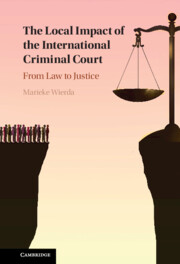Book contents
- The Local Impact of the International Criminal Court
- The Local Impact of the International Criminal Court
- Copyright page
- Contents
- Acknowledgments
- Abbreviations
- Introduction
- 1 A Framework for Assessing the Impact of the ICC
- 2 Systemic Effect I
- 3 Systemic Effect II
- 4 Transformative Effect I
- 5 Transformative Effect II
- 6 Societal Impact I
- 7 Societal Impact II
- 8 Conclusion: From Law to Justice
- Postscript
- Book part
- Index
1 - A Framework for Assessing the Impact of the ICC
Published online by Cambridge University Press: 06 July 2023
- The Local Impact of the International Criminal Court
- The Local Impact of the International Criminal Court
- Copyright page
- Contents
- Acknowledgments
- Abbreviations
- Introduction
- 1 A Framework for Assessing the Impact of the ICC
- 2 Systemic Effect I
- 3 Systemic Effect II
- 4 Transformative Effect I
- 5 Transformative Effect II
- 6 Societal Impact I
- 7 Societal Impact II
- 8 Conclusion: From Law to Justice
- Postscript
- Book part
- Index
Summary
The ICC was meant to end impunity for the world’s worst crimes, thus contributing to their prevention. But twenty years after its establishment, its “theory of change” remains unclear, and few studies focus on its impact on the ground. To assess the Court’s impact, it is necessary to define the assumptions underlying its establishment. While deterrence is one such assumption, to date the evidence that the ICC effectively deters crimes is lacking. Other assumptions can be found in the Rome Statute itself, or in the expressed intentions of the Assembly of States Parties or senior officials of the Court. Lessons can also be drawn from impact studies of other international criminal tribunals. These sources indicate that the ICC should play an expressive function by engaging in norm projection. The chapter identifies four intended effects of the Rome Statute and ICC, including systemic effect on domestic legal systems; transformative effect on peace processes; reparative effect on victims; and demonstration effect, relating to its expressive function among affected communities. These four effects form an analytical framework to assess the impact of the ICC.
Keywords
- Type
- Chapter
- Information
- The Local Impact of the International Criminal CourtFrom Law to Justice, pp. 9 - 49Publisher: Cambridge University PressPrint publication year: 2023



